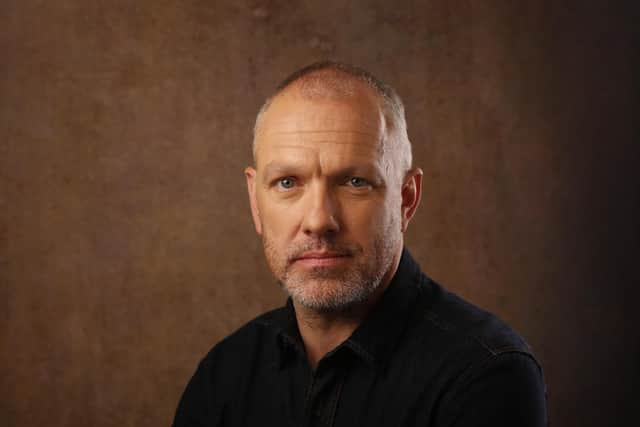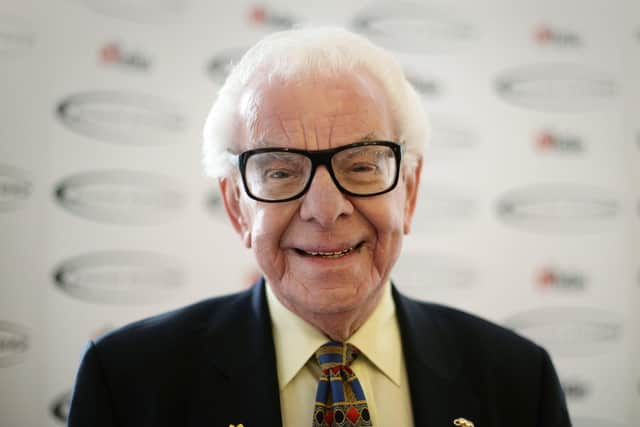Barry Cryer: Son Bob reflects on talent of Yorkshire comedy legend and the humble father behind the jokes
“It always gave you a lovely feeling that dad was confirming he had a good time and that there would be a tomorrow,” son Bob reflects.
The day that the Leeds-born writer, comedian, and actor passed away, his family were desperate to hear those words again as they gathered by his bedside in hospital. Sadly, of course, the phrase never came.
Advertisement
Hide AdAdvertisement
Hide AdFor Bob, writing his late father’s biography, published yesterday, presented a way of “creating a tomorrow that would always be there”.


Barry Cryer: Same Time Tomorrow? Is his story of the man behind the jokes, sharing the life of a comedy legend and offering an insight into more than six decades in the entertainment industry.
“[Dad] was asked on several occasions to write an autobiography but he was spectacularly bad about talking about himself,” Bob says. “Partly through humility, partly through a Yorkshire trait of not getting too big for your boots.”
Barry was born in Leeds in 1935, the son of John Cryer, a Jewish accountant, who died when Barry was five, and his wife Jean.
Advertisement
Hide AdAdvertisement
Hide AdThere is no doubt, Bob says, that his father’s childhood in the region helped to forge his world view and his sense of humour. It also set him off on the road of a career that would not only lead to him being celebrated for his talent, but also praised for his nurturing spirit and a natural gift of making people feel comfortable and welcome.


After his brother left for the navy, Barry spent much of his formative years at home with his mother, a woman of few words.
“Dad really had to invent his own play. His own imagination needed to take over and he found inspiration in the wireless like a lot of people of his generation. He found himself really gravitating towards the radio and the great comedians like Tommy Handley and Tony Hancock that were on at the time.”
Barry acquired a taste for comedy by making his mates at Leeds Grammar laugh, as a bulwark against bullying. In his short time at university - he dropped out after a year - he spent more time performing than studying and appeared in revue at the old Leeds Empire Theatre.
Advertisement
Hide AdAdvertisement
Hide AdSetting aside his original intention to become a journalist, he then set off for London to see if he could make a living in the entertainment business.
Barry gave himself just 17 days before his return ticket to Leeds awaited, and in that time he impressed the impresario Vivian Van Damm enough to secure a booking on the bottom of the bill at the Windmill Theatre, where comedians punctuated the nude tableau shows.
Soon though, chronic eczema, which resulted in several periods in hospital, cut short Barry’s performing career and instead he concentrated on writing.
“As a performer, eczema on the face was something very difficult to overcome, particularly in the days where there was quite heavy makeup,” Bob says. “His skin used to flare up and he actually wasn’t physically able to perform and he was really quite depressed.”
Advertisement
Hide AdAdvertisement
Hide AdBarry began writing for the TV shows of Jimmy Logan and other star comics of the day. He also became head writer and an occasional performer at Danny La Rue’s cabaret club.
It was there that he was spotted by David Frost, who asked him to work on his upcoming variety special, A Degree of Frost. Frost then used Cryer on a number of subsequent shows, helping to establish him as a comedy writer in the 1970s.
“Dad was using that journalistic instinct for very quick character study, knowing exactly what the story was, but also taking the shortest route to the punchline,” Bob reflects. “He was a very economical writer and I think he learnt that because of his journalistic instincts…He became a very attractive possibility for producers because he delivered. Very often he said it might not be good, but it will be there on Monday.”
“Keeping your feet on the ground and not getting too much beyond your station, I think, formed a personality in dad that works particularly well in showbusiness, an arena stuffed full of ego,” he continues. “If you’ve got a very grounded personality, I think it becomes very attractive to work with. He wore his Yorkshire roots quite proudly.”
Advertisement
Hide AdAdvertisement
Hide AdBarry went on to pen material for the most recognisable names in British comedy. His list of clients was a veritable showbusiness encyclopaedia – from Morecambe and Wise to Bob Hope, with Kenny Everett, Tommy Cooper and the Two Ronnies in between.
“Dad loved comedy when everything was falling apart, when the wheels were coming off, which is why I’m Sorry I Haven’t A Clue was such a mainstay of his life,” Bob says.
“He loved professional amateurism - there’s a humility to that. It’s not telling the audience that what you’re doing is so slick, it’s showing your workings out in the margin...It’s saying we know things are falling apart but we’re going to have fun anyway.”
When Barry died, aged 86, in January 2022, there was a vast outpouring of grief and appreciation, from audiences who loved him and fellow comics alike. When Bob, the youngest of four, was later approached about writing his father’s biography, one thought more than any other persuaded him to go for it - he didn’t want anyone else to do it.
Advertisement
Hide AdAdvertisement
Hide AdAn actor and writer himself, perhaps best known for Coronation Street and Hollyoaks, he had previously worked with his father, collaborating on Barry’s book of anecdotes, before they together created the book series Mrs Hudson’s Diaries, which was adapted into a play. Mrs Hudson’s Radio Show soon followed for Radio 4, and their joint podcast, Now Where Were We?, launched just before Barry’s death.
“I was still so connected as I got older to dad’s energy and love for what he did and started writing more comedy myself,” Bob says. “It became inevitable, in a way, that we would work together.
“I got to know more about my dad through talking about his work and working with him than I think I did as his son…I found the place where he was most comfortable…I was more able to connect with him on a philosophical level and an intellectual level sitting down at the table writing with him and seeing that genius he had for distilling comedy into its purest form, very good with character, very good with punchlines.”
For Bob, the biography is an ode both to Barry’s incredible life and to the lessons that he so generously imparted on the art of comedy during his career. He was a man, his son remembers, who was good at keeping a lid on things, who always had time for every person he met at a venue, who demonstrated it was possible to disagree but not to be disagreeable, to deliver without ego.
Advertisement
Hide AdAdvertisement
Hide AdHis father was, he says, a man affectionately known by his peers and audiences as Uncle Barry; easy to work with, good fun and the first to hold out his hand to young comedians and writers coming into the business.
“I was very aware of how well-liked my dad was within the industry, but I think the thing that surprised me was the consistency of that love and goodwill and the volume of it,” Bob says.
“I think there were a lot of young comics and writers in the industry that learnt a tremendous amount from dad in the way that he behaved,” he continues.
“If an idea didn’t work, he would scrunch up the paper, throw it away and start again and he had no ego about that. He would always defer to comedy is very empirical - if people laugh, it makes the cut. If they don’t, he’d start again.”
Advertisement
Hide AdAdvertisement
Hide AdBob’s own personal reflections on living and working with Barry are captured within the book, an affectionate biography of a father by a son. Writing it was a heartwarming journey.
“I think there was a bit about dad’s early life when he was struggling to make it as a performer and as a writer that I enjoyed revisiting that he didn’t really talk about much,” Bob says.
“I discovered a lot more about the dogged determination he had and it was really quite inspiring, given I’m in the same business as an actor and writer. I took great solace from the fact he hung in there when it was looking really bleak.
“It has been quite the pleasant walk down memory lane to revisit so many moments and put them into some kind of context. I hope it talks about and celebrates dad in a way he was never comfortable doing himself.”
Barry Cryer: Same Time Tomorrow?: The Life and Laughs of a Comedy Legend by Bob Cryer is out now. Bloomsbury Publishing, Hardback, £20.
